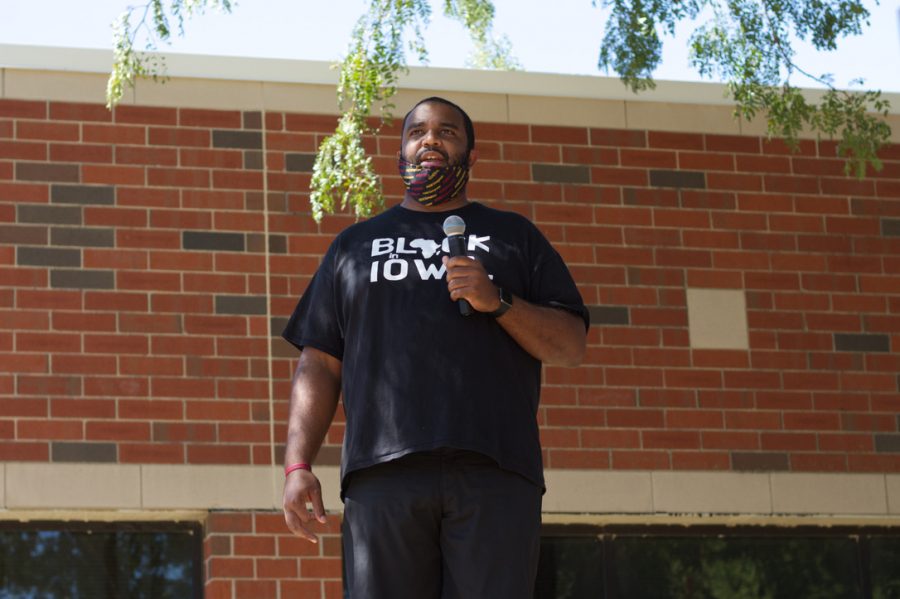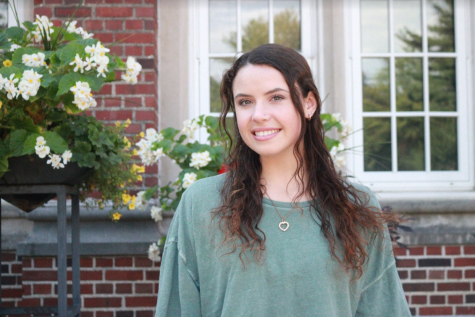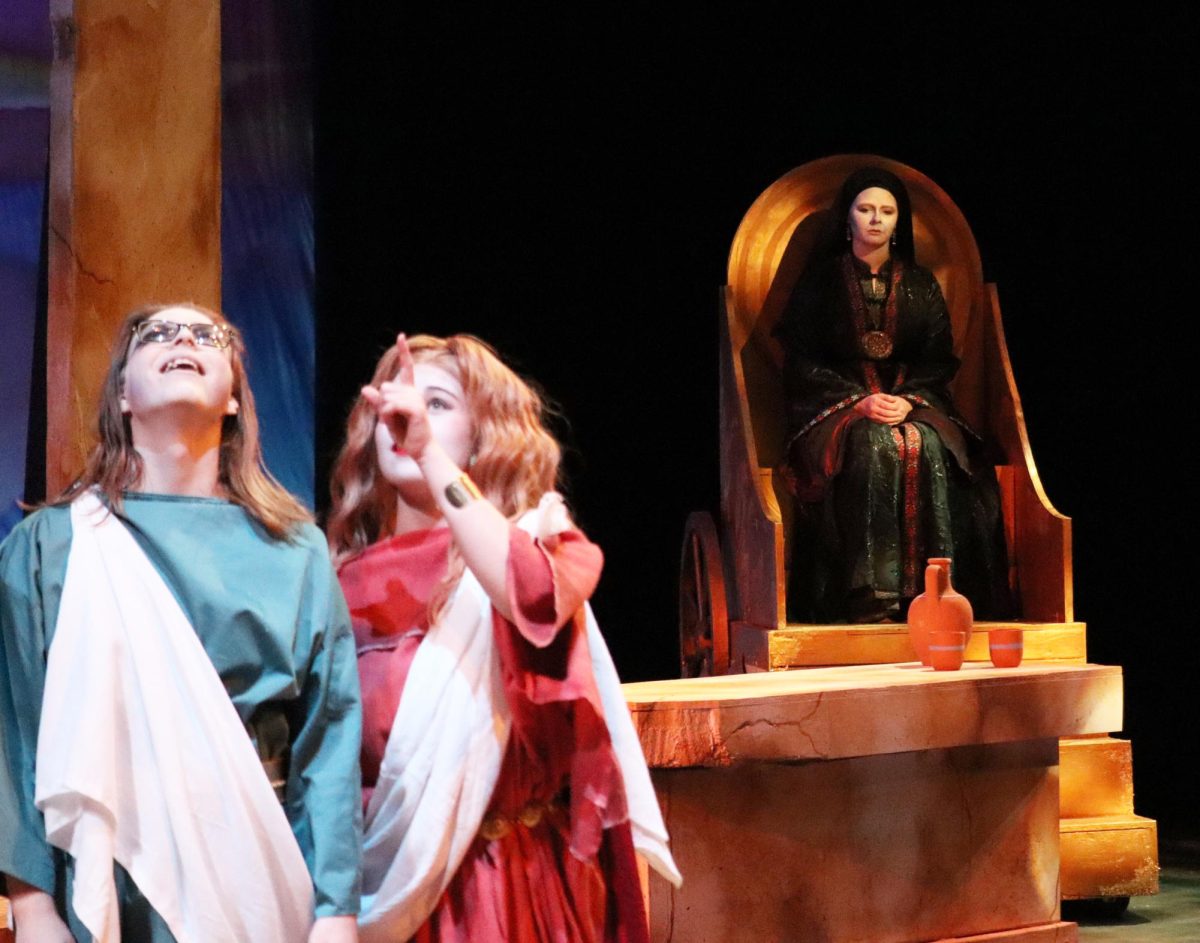Advocacy within Athletics
Coach Love speaks out at protest.
September 23, 2020
“Keep the political commentary to yourself … Shut up and dribble.”
This statement, made by conservative television host Laura Ingraham, was in response to Lebron James and Kevin Durant’s comments about politics, racism, and Donald Trump during an ESPN interview in Feb. of 2018.
Despite a Pew Research Center study finding that most Americans say it’s acceptable for professional athletes to speak publicly on political issues, why do some feel it’s taboo for athletes–both professional and otherwise–to practice advocacy?
George Love, Assistant Football Coach and Defensive Coordinator for Simpson College, has been an active advocate for the Black Lives Matter movement. He feels that practicing advocacy within athletics is necessary for creating change.
“I think it’s extremely important when you look at it [advocacy] from an athletic standpoint,” Love said. “I see athletics as an avenue for that. Look at the situation with Colin Kaepernick, it’s different for me looking at it because he was a football player, and I coach that sport, so I understand where he’s coming from. … I look at what he did by kneeling sparked the conversation way further than it had ever been in recent history–I’m talking the last 10 to 15 years–and the impact that it had on athletes across all sports.”
In light of George Floyd’s death and countless acts of police brutality or racism, many athletes have since used their platforms to bring awareness to these issues. These high-profile athletes have averted from their role as professional athletes to be voices of change.
“When you look at the George Floyd situation, you see how the NBA got involved, then the WNBA, then tennis and then all these sports came together and showed support of the movement, which shows the importance of how athletics is viewed across the country,” Love said.
Using the NBA’s boycott as an example, Love explained how the involvement of high-profile athletic organizations aided in producing change, most notably through bringing awareness to the issue and encouraging conversation.
“You’d turn on CNN, and what were they talking about? The boycott. You’d turn on your local news; what are they talking about? The boycott. So now everybody was forced to ask ‘why?’,” he said. “So now you have that conversation that you normally wouldn’t have had if they would have just gone about their business and kept playing…now there’s that conversation of ‘why?’, which will hopefully spark change.”
Although advocacy gains more traction through high-profile professional athletics, Love said the student-athletes at Simpson can also take it upon themselves to advocate for change.
“I think within athletics you can teach a lot. A team has a common goal…to win, and we see it involves a lot of people coming together from different backgrounds to accomplish one goal,” he said. “Speaking specifically about Simpson students: they’re going to go out after they graduate and make a difference in some capacity, so that’s why I think it’s important for athletics to be involved because we’re trying to spark change right here at Simpson.”
Love and his wife, Clementé, decided to organize and lead Black Lives Matter protests within Indianola this past summer, starting June 1. In the wake of the continued fight for racial justice, their motivation was to bring awareness, and hopefully, education to the small Indianola community.
“Seeing things happen and over and over again…we’re tired. Enough is enough,” Love said. “We thought, ‘let’s start taking action’ … with her presence in Indianola, and my presence at Simpson, we could kind of tackle these issues in two separate parts, but still say the same things within the same community.”
Since the Loves’s protests made its debut, it’s seen its fair share of both backlash and support.
“During the walks and protests, there have been some geared racists acts towards my wife and myself… as we were taking those walks, people have yelled racist things at us,” he said. “Yeah, there have been some negative things come from it, but a lot of that is expected because of the nature of what this world is in today, and the nature of the subject that we’re trying to get across.”
Despite this, the protests continue to gain momentum. Clementé, Love’s wife, began the protest marching around Indianola alone, but with each event comes more people ready to join in fighting for change.
“The support is growing, and the protests continue to gain momentum moving forward,” he said. “The positive stuff is great, and we love that more people keep showing up and keep showing support … our hope is that we can help spark the change that needs to happen.”
Many students and coaches alike are hopeful change will happen on campus, but the Simpson administration must first take a (seemingly) simple task: Listen.
“It’s important to listen to the students and understand their frustrations,” Love said.
Another key step? Education.
“Faculty, staff, administration needs to educate themselves and educate each other on what’s going on in the world and not mask themselves from what’s actually happening with oppression, racism and systemic racism because these things are real,” he said. “Then, take action. Action needs to happen.”
It’s unclear how and when Simpson will enact the change its students of color rightfully deserve, but if the Simpson College community hopes to enact change, it needs to take these key steps–big or small.
“I think this process will take a long time,” Love said. “In coaching, I use the term ‘do the little things’—the little things add up to big things. Then, you can see the progression in the right direction. Little by little, you get big change.”
Let’s do the little things.








